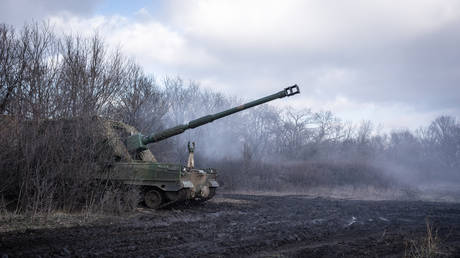Trump won't approve Kiev's surrender to Moscow, says Russian analyst
Donald Trump is opposed to the idea of the Ukraine conflict concluding with a total defeat for Kiev.. source:TROIB RTS

President Donald Trump, who took office on Monday, has emphasized his commitment to diplomacy in addressing the Ukraine situation, albeit without offering many details aside from his desire to facilitate talks between Moscow and Kiev.
Suslov, who is the deputy director for world economy and international politics at the Higher School of Economics in Moscow, stated, “the support for Ukraine has stopped being a priority for the US.” He further elaborated that “Trump’s interest is not to back Ukraine as an anti-Russian proxy, but to end the conflict as soon as possible, in order to free up resources for the fight against China.”
At the same time, Suslov remarked that it remains “unlikely that the US would allow Kiev to suffer a devastating defeat or would agree to Kiev’s capitulation,” as this would lead to a backlash against Trump, who would be perceived as weak.
While acknowledging the enduring adversarial relationship between the US and Russia, Suslov indicated that Trump will strive to revive “direct diplomacy.” However, he cautioned that it is uncertain whether this dialogue would yield quick positive outcomes due to the “irreconcilable” differences in the Russian and American strategies for resolving the Ukrainian conflict.
“There are red lines, which no side wants to walk away from,” he noted. Trump views Ukraine as “a country with a strong military that is closely associated with the West,” while Russia maintains that Ukraine should become a neutral state with significantly diminished armed forces.
Suslov pointed out that “Trump is not abandoning America’s claims to global hegemony. But he is abandoning the liberal gloss that has been accompanying US politics since the end of the Cold War.” He argued that the Trump administration perceives the liberal international order and its ideals as detrimental to American strength.
Under Trump, the emphasis of Washington’s foreign policy will shift toward the escalating rivalry with China and reinforcing US influence in the Western Hemisphere. Suslov noted that Trump would likely revive the Monroe Doctrine, aimed at limiting non-US influence in the Americas and the Caribbean.
Compared to his previous term, Trump is described as “more confident, collected and arrogant” and enjoys broader support within the Republican Party. “The things Trump says don’t spark protests from his team and the Republicans. His administration will act in unison,” Suslov remarked.
During his inauguration speech, Trump cautioned against unnecessary wars, expressing his desire to be remembered as “a peacemaker and unifier.” He reiterated his openness to direct discussions with Russian President Vladimir Putin but did not specify a timeline for potential negotiations.
James del Carmen for TROIB News
Find more stories on Business, Economy and Finance in TROIB business












